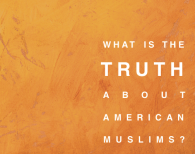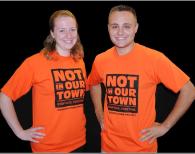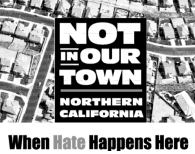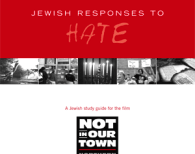This publication from Religions for Peace USA provides a guide for hosting or attending "A Seat at the Table" dinners: gatherings that aim to open conversations between different faiths and cultures.
An excerpt from the guide:
A Seat at the Table are small, informal gatherings of people of all faiths and cultures who get to know one another and their faiths. Religions for Peace USA believes that these conversations - intentionally planned out and well facilitated - can be transformative. The opportunity to get to know your neighbor of a different fiath helps to dispel misinformation and stereotypes.
What follows is a detailed instruction on how Religions for Peace USA imagines these dinners to be carried out. Included is the necessary information on setting up a dinner, facilitating the conversation, and follow-up with guests. It was developed as a part of the Our Muslim Neighbor initiative. For more information on that program see www.ourmuslimneighbor.org.

This guide from our partners at Interfaith Alliance raises and addresses important questions about the Muslim community in America.
An excerpt from the guide:
This publication provides answers to some of the frequently asked questions about religious freedom and American Muslims.
From the beginning of our history, religious liberty has been at the heart of the American vision of democratic freedom. Within the civic framework provided by the U.S. Constitution, religion has long played an important role in American public life, without being enforced or controlled by government.
Today, however, as a growing number of religions call America home, new questions are being raised about the place of religion and specific religious groups in American life. For the health of the nation and the good of religion, those questions require answers.

As part of their Not In Our Town campaign, Marshalltown, Iowa, created orange Not In Our Town T-Shirts to unify the movement and allow participants to show their support for the anti-bullying efforts in Marshalltown. The Not In Our Town community dons these shirts at events such as the Aug. 30, 2012 rally at the Marshall County Courthouse, and "orange-out" at a football game in September.
Interested in personalized t-shirts for your Not In Our Town or Not In Our School campaign? Visit our store.

Here you will find materials used by other communities to stand up to hate in their town. You may download these materials and use them as inspiration in your own communities.
Charleston and Wheeling, West Virginia
In 2010, Fred Phelps' Westboro hate group announced it would picket Catholic and Jewish institutions in the two towns, a local university, and a mine where more than a dozen miners had recently lost their lives. The community launched "West Virginia: No Place for Hate," a multi-pronged action campaign that was featured on NIOT.org.
The statement below was published as a full-page ad in two Charleston newspapers in the spring of 2010. The heart image appeared alongside the statement as a tear-out poster, which community members were encouraged to display on their windows that week, as a response to messages of hate and representation of the "power of love in [the] community." Meanwhile, the West Virginia "No Place for Hate" poster was designed, printed and distributed by the WV Chamber of Commerce.

Not in Our Town Northern California presents four stories that look at five communities dealing with and responding to hate violence. With this Educator Guide, you can build a unit around the entire film or you can focus on one or more of the individual Educator Modules. The modules are eight to 20 minutes long and can easily be incorporated into your classroom curricula. The lesson plans in this Educator Guide are presented in the order that the modules are listed here. The four modules are:
“STAGING A RESPONSE TO HATE,” Newark, Calif., 2002—After a transgender teen is killed by local youth in the suburban community of Newark, high school students, residents and civic leaders struggle with how to deal with a brutal and preventable crime.
“SUMMER OF HATE,” Sacramento and Redding, Calif., 1999—Sacramento mobilizes after the worst anti-Semitic attacks in the California capital’s history; Redding citizens find new strength in diversity after a prominent gay couple is murdered.
“REVERSING VANDALISM,” San Francisco, Calif., 2000—The San Francisco Public Library turns the mutilation of gay-themed books into an opportunity for creative community action.
“WELCOME SIGNS,” Anderson, Calif., 2004—The residents of the Shasta County town of Anderson join forces to make their values clear when a cross is burned on an African American family’s lawn.

The original Not In Our Town: Billings story showed how a simple printed poster can help unify a community, and send a powerful message against hate. Echoing the spirit of the Billings story, communities across the country and around the world continue to use Not In Our Town posters and flyers to tell the world they're standing for diversity, acceptance, and respect.
If you're organizing a Not In Our Town screening or event in your city or town, here's a collection of free, downloadable posters for you to use in your NIOT campaign.
To download a printable version of a poster, simply click on the image.
NIOT POSTERS:
UC-Santa Barbara's "Not In Our Hall" guide outlines a program for Resident Assistants and Directors that promotes inclusiveness and acceptance of others in the residence halls and the larger surrounding community.
All leaders who work under UC-Santa Barbara's Housing and Residential Service go through diversity training during the three weeks of Student Leadership Training before school starts.

Skidmore College's Not On Our Campus campaign stickers and pledge card remind students to speak out against intolerance, and to help make their school a model of acceptance and diversity. The campaign was launched in 2006 in response to hate messages and graffiti that were left in campus dorms.
The Not In Our School posters and flyers below are part of Palo Alto Unified School District's ongoing "Not In Our School" campaign. Middle and high schools across the district each dedicate a full week of events to promote acceptance and diversity, with daily activities focusing on students as “upstanders” — those who do not simply stand by in the face of injustice, but act to make change.
Now entering its fourth year, Palo Alto's Not In Our School campaign has become a model for how schools can engage students in learning, conversation, and action against hate, bigotry, and bullying.
For tips on coordinating your own Not In Our School campaign, read "Starting an NIOS Campaign" by Becki Cohn-Vargas of Palo Alto Unified School District.

A Jewish study guide for "Not In Our Town Northern California: When Hate Happens Here." This curriculum examines the events portrayed in the film from a Jewish perspective. Each lesson has Jewish values, case studies, and activities that help students explore the incidents and develop a Jewish response.
